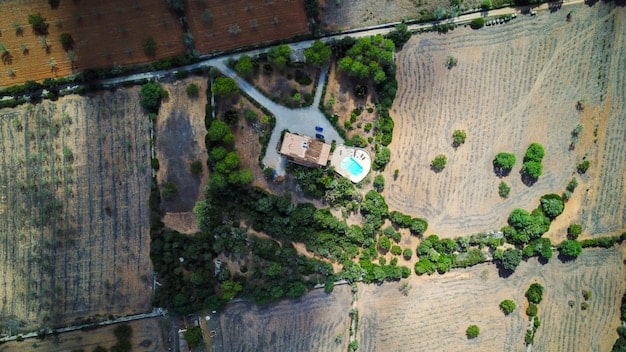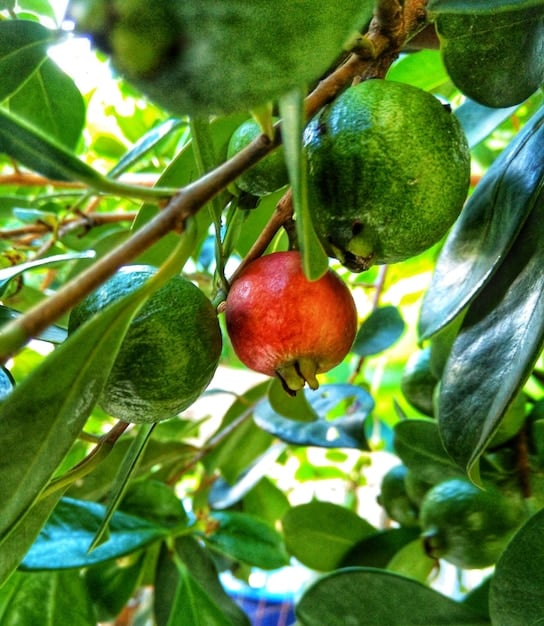Agribusiness in Mexico 2025: Untapped Potential for US Investors

Mexican agribusiness presents a compelling, often overlooked, investment frontier for US investors in 2025, offering robust growth, proximity to markets, and diverse opportunities across various agricultural sub-sectors, driven by favorable trade agreements and evolving consumer demands.
For US investors eyeing burgeoning markets, the landscape of agribusiness in Mexico: untap potential for US investors in 2025 stands out as a particularly compelling, yet often underestimated, opportunity. Mexico, with its vast agricultural resources, strategic geographical position, and evolving economic dynamics, offers a fertile ground for strategic investments that promise significant returns.
Advertisements
The Strategic Advantage of Mexican Agribusiness
Mexico’s agricultural sector is more than just traditional farming; it is a dynamic industry benefiting from unique geographical, climatic, and economic conditions. Its proximity to the United States and Canada, coupled with favorable trade agreements, positions it as an ideal partner for US investors looking to diversify portfolios and secure supply chains.
Geographical Proximity and Logistical Efficiencies
The shared border between Mexico and the US inherently reduces transportation costs and transit times, making Mexican produce highly competitive. This logistical advantage is critical for perishable goods, ensuring freshness and reducing waste.
- Reduced freight costs for easier market access.
- Faster delivery times to major US distribution hubs.
- Streamlined customs processes due to established trade routes.
Beyond the immediate border, Mexico’s extensive network of ports and railways further enhances its logistical capabilities, connecting agricultural production centers to global markets with increasing efficiency. This connectivity is a major draw for investors seeking robust supply chain solutions.
NAFTA/USMCA and Trade Facilitation
The United States-Mexico-Canada Agreement (USMCA), formerly NAFTA, provides a stable and predictable framework for trade. This agreement eliminates most tariffs on agricultural products, fostering an environment where cross-border investment can flourish without undue trade barriers.
- Tariff-free access for a wide range of agricultural products.
- Harmonized regulations promoting fair competition.
- Dispute resolution mechanisms offering investor protection.
The USMCA acts as a cornerstone for investor confidence, ensuring that investments made in Mexican agribusiness are supported by a clear and enforceable legal framework, reducing geopolitical and trade-related risks. This stability is invaluable for long-term strategic planning.
The strategic benefits of investing in Mexican agribusiness extend beyond economic considerations; they also encompass a rich tradition of agricultural expertise and a vibrant workforce. This combination creates a fertile ground for innovation and expansion.
Key Growth Sectors and Opportunities
The Mexican agribusiness sector is incredibly diverse, offering a multitude of investment avenues. While traditional crops remain important, significant growth and profitability are found in high-value horticulture, organic produce, and the processing of agricultural raw materials.

High-Value Horticulture: Avocados, Berries, and Tomatoes
Mexico is a global leader in the production and export of high-value horticultural products. Consumers in the US have a strong demand for these items, creating consistent and lucrative markets. Investments in advanced cultivation techniques, such as protected agriculture (greenhouses and shade nets), can yield substantial returns.
Avocados, in particular, remain a star performer, with Mexico as the world’s largest producer and exporter. The demand continues to surge globally. Berries (strawberries, raspberries, blueberries) also show robust growth, driven by health trends and year-round availability. The controlled environments offered by modern greenhouses make tomato production highly efficient and profitable.
Organic Farming and Sustainable Practices
The global shift towards organic and sustainably produced food presents a significant opportunity. Mexican producers, particularly small and medium-sized farms, are increasingly adopting organic certification, catering to a growing niche market in the US willing to pay a premium for such products.
- Growing consumer demand for organic produce.
- Higher profit margins for certified organic products.
- Potential for impact investing focusing on environmental sustainability.
Investing in organic certifications, sustainable water management, and eco-friendly packaging can distinguish a product in the highly competitive US market, appealing to environmentally conscious consumers and driving brand loyalty. These practices are not just trends but represent a fundamental shift in agricultural production.
Food Processing and Value-Added Products
Beyond raw produce, there’s immense potential in processing agricultural raw materials into value-added products. This includes everything from frozen fruits and vegetables to salsas, purees, and specialized ingredients for the food industry. Adding value at the source captures a larger share of the profit margin.
- Reduced post-harvest losses through processing.
- Creation of new product lines for diverse markets.
- Leveraging local ingredients for unique, marketable products.
For example, processing surplus avocados into guacamole or oil, or converting berries into jams and juices, directly increases revenue streams and reduces dependency on fresh market price fluctuations. This diversification strategy provides a buffer against agricultural market volatility.
Addressing Potential Challenges and Risks
While the opportunities in Mexican agribusiness are considerable, potential investors must also be aware of and prepared to mitigate various challenges. A thorough understanding of these risks allows for more robust investment strategies and due diligence.
Water Management and Resource Scarcity
Water scarcity is a growing concern globally, and Mexico is no exception. Sustainable water management practices, including efficient irrigation systems, rainwater harvesting, and wastewater treatment, are crucial for long-term viability. Investments in these technologies are not just environmentally responsible but also economically prudent.
The changing climate also brings irregular rainfall patterns, which directly impact agricultural output. Utilizing drought-resistant crop varieties and implementing precision agriculture techniques can help mitigate these effects. It is vital for investors to assess local water availability and engage with local communities on water resource sharing.
Logistical and Infrastructure Bottlenecks
Despite improvements, some regions in Mexico still face infrastructure limitations, including inadequate road networks, storage facilities, and cold chain logistics. These bottlenecks can lead to post-harvest losses and limit access to markets. Strategic investments in improving these aspects can unlock significant value.
- Investing in cold storage facilities to extend shelf life.
- Developing efficient transportation routes from farm to market.
- Exploring public-private partnerships for infrastructure development.
Addressing these infrastructure gaps is not just about moving products; it’s about preserving quality and expanding market reach. Collaborations with local logistics providers and government agencies can help overcome these hurdles effectively.
Land Tenure and Regulatory Complexities
Navigating Mexico’s land tenure system can be complex, involving different types of land ownership, including ejido (communal land). Understanding local laws and regulations, and engaging legal counsel experienced in Mexican land transactions, is essential to ensure secure land acquisition and operation.
- Understanding ejido land laws and their implications.
- Ensuring proper diligence on land titles and ownership.
- Compliance with environmental regulations and permits.
Regulatory frameworks in agriculture can also be intricate, covering aspects like food safety, labor laws, and import/export regulations. Partnering with local experts and maintaining strict adherence to all legal requirements will minimize operational risks and foster a good relationship with local authorities.
Leveraging Technology and Innovation
The future of agribusiness, both globally and in Mexico, is inextricably linked with technological advancement. US investors have a unique opportunity to introduce and scale cutting-edge innovations that can revolutionize Mexican farming practices, enhancing efficiency, sustainability, and profitability.
Precision Agriculture and Data Analytics
Precision agriculture involves using data to optimize farming inputs and practices. This includes GPS-guided machinery, soil sensors, drone-based aerial imaging, and real-time weather monitoring. These technologies allow for more efficient use of water, fertilizers, and pesticides, reducing costs and environmental impact.
- Optimizing water and nutrient usage through intelligent systems.
- Early detection of crop diseases and pest outbreaks.
- Improved yield forecasting and resource allocation.
By leveraging big data analytics, farmers can make more informed decisions, leading to higher yields and better quality produce. For US investors, introducing these technologies can provide a significant competitive advantage and attract more tech-savvy local talent.
Biotechnology and Improved Crop Varieties
Investments in agricultural biotechnology can lead to the development of new crop varieties that are more resilient to pests, diseases, and adverse climatic conditions. This includes genetically modified (GM) crops, though their adoption requires careful consideration of regulatory and public acceptance factors, and increasingly, gene-edited crops.
Non-GM approaches also offer significant promise, such as marker-assisted breeding to select for desirable traits more quickly. These advancements can lead to more robust and higher-yielding crops, securing food production in the face of environmental challenges. Collaboration with Mexican research institutions can be beneficial here.
Automated Systems and Robotics
Automation in agriculture, from robotic harvesters to automated irrigation systems, can significantly reduce labor costs and improve operational efficiency. While initial investment costs can be high, the long-term benefits in terms of productivity and consistency are substantial.
- Reducing dependence on manual labor for repetitive tasks.
- Enhancing harvest efficiency and minimizing crop damage.
- Improving worker safety in hazardous agricultural environments.
The careful integration of robotic systems, especially for high-value crops like berries which require delicate handling, can lead to superior product quality and a more efficient workflow. These technological infusions can transform traditional farming into high-tech operations, appealing to a modern investment profile.
Connecting with Local Partners and Expertise
Successful investment in any foreign market hinges on understanding the local context and building strong relationships. In Mexico’s agribusiness sector, partnering with local experts and organizations is not just an advantage; it is often a necessity for navigating cultural nuances, regulatory landscapes, and market specifics.
Benefits of Local Partnerships
Local partners bring invaluable insights into regional agricultural practices, supply chain dynamics, and consumer preferences. They can facilitate essential connections with local farmers, community leaders, and government officials, streamlining operational setup and cultural integration.
- Access to established local distribution networks.
- Deeper understanding of regional agricultural practices.
- Navigation of cultural and social dynamics.
Moreover, local partners can provide crucial support in areas like labor relations, land procurement, and compliance with local environmental standards, significantly reducing risks and accelerating market entry. Their expertise can bridge the gap between foreign investment strategies and local realities.
Identifying and Vetting Potential Partners
Thorough due diligence is paramount when selecting a local partner. This involves evaluating their financial stability, track record, reputation, and alignment with investor values. Look for partners with a proven history in agribusiness and a strong network within the sector.
Engaging legal and financial advisors with expertise in cross-border transactions can provide an additional layer of security during the vetting process. Site visits, interviews, and reference checks should be standard practice before formalizing any partnership agreement.
Collaborating with Agrarian Organizations and Farmers
Direct engagement with agrarian organizations, farmer cooperatives, and individual farmers fosters goodwill and sustainable relationships. These collaborations can provide access to land, labor, and agricultural knowledge, while also empowering local communities.
- Creating employment opportunities for local populations.
- Sharing modern agricultural techniques and best practices.
- Contributing to the social and economic development of rural areas.
Such collaborative models can lead to more resilient supply chains and better community relations, which are increasingly important for long-term investment success. Building trust and a shared vision ensures that both investors and local communities benefit from the agribusiness ventures.
Government Support and Economic Landscape
The Mexican government actively supports the agricultural sector through various programs and initiatives, aiming to increase productivity, promote sustainability, and attract foreign investment. Understanding this enabling environment is crucial for US investors.
Government Programs and Incentives
Mexico offers several federal and state-level programs designed to boost agricultural production, modernize farming practices, and encourage investment. These can include financial incentives, technical assistance, and support for certifications. Investors should research these programs to maximize benefits.
Specific initiatives often focus on improving irrigation infrastructure, providing credit to farmers, and promoting exports. Engaging with government agencies like the Secretariat of Agriculture and Rural Development (SADER) can provide valuable insights into available support and regulatory frameworks.
Economic Stability and Growth Projections
Mexico’s economy has demonstrated resilience, with a growing middle class that fuels domestic demand for high-quality food products. The country’s stable macroeconomic environment, coupled with ongoing reforms, provides a reliable foundation for long-term agricultural investments.
- Steady GDP growth supporting domestic consumption.
- Favorable inflation rates and exchange rate stability.
- Increasing foreign direct investment (FDI) across sectors.
Projections for Mexico’s economic future suggest continued growth, particularly as global supply chains reconfigure. This economic backdrop ensures that investments in agribusiness are not just about export markets but also about serving a robust and expanding domestic consumer base.
Trade Relations Beyond USMCA
While USMCA is primary, Mexico has a broad network of free trade agreements (FTAs) with over 50 countries, including the European Union, Japan, and members of the Pacific Alliance. This extensive network provides Mexican agricultural products with preferential access to diversified global markets.
For US investors, this means that products grown and processed in Mexico can potentially access a wider range of international markets on favorable terms, enhancing export opportunities and reducing reliance on a single market. This global access adds another layer of attractiveness to Mexican agribusiness ventures.
Future Outlook and Why 2025 is Crucial
The confluence of factors makes 2025 a particularly opportune moment for US investors to consider Mexican agribusiness. Global trends, regional dynamics, and internal Mexican developments are aligning to create a fertile investment climate.
Global Food Security and Supply Chain Resilience
Post-pandemic, there’s an increased global focus on food security and resilient supply chains. The disruptions exposed vulnerabilities, prompting a push for more localized and diverse sourcing. Mexico, as a reliable neighbor, perfectly fits this strategic repositioning.
Investors seeking to build robust food supply chains, less susceptible to distant geopolitical shocks or logistical nightmares, will find Mexico’s proven agricultural capacity and logistical advantages highly appealing. This trend is likely to intensify, making early entry advantageous.
Evolving Consumer Preferences in the US
US consumers are increasingly prioritizing fresh, healthy, and ethically sourced foods. This trend aligns perfectly with Mexico’s strengths in fresh produce and a growing movement towards organic and sustainable farming. Investments that cater to these preferences will find a receptive and growing market.
- Increased demand for fresh and minimally processed foods.
- Preference for transparent and sustainable sourcing.
- Growing interest in exotic and diverse food options.
Understanding and aligning with these evolving consumer habits allows investors to capture significant market share and build strong brand loyalty. Mexico’s diverse agricultural offerings are well-positioned to meet these sophisticated consumer demands.
Nearshoring and Regionalization of Production
The nearshoring trend, where companies move production closer to their main markets, is gaining significant traction. For US companies, Mexico offers an attractive destination due to its proximity, cost-effectiveness, and existing trade infrastructure. This trend extends beyond manufacturing to agriculture.
Investing in Mexican agribusiness aligns with a broader strategy of regionalizing supply chains, reducing reliance on distant and potentially volatile sources. This strategic shift makes 2025 a pivotal year for establishing strong, regional agricultural partnerships and investments.
| Key Point | Brief Description |
|---|---|
| 📍 Proximity Advantage | Mexico’s border with the US offers superior logistics and reduced costs for agricultural exports. |
| 📈 Growth Sectors | High-value horticulture (avocados, berries) and organic farming show significant potential. |
| 💡 Tech Integration | Opportunities to introduce precision agriculture, biotech, and automation for efficiency gains. |
| 🌐 Trade Agreements | USMCA and other FTAs provide stable, tariff-free access to major international markets. |
Frequently Asked Questions About Agribusiness Investment in Mexico
▼
The primary benefits include geographical proximity, allowing for reduced transportation costs and faster delivery to US markets. Favorable trade agreements like USMCA ensure tariff-free access, providing a stable and predictable trade environment. Additionally, Mexico’s diverse climate supports a wide range of crops, reducing seasonal dependence and ensuring year-round supply for US consumers.
▼
High-value horticulture, particularly avocados, berries, and tomatoes, presents significant opportunities due to high demand in the US. Organic farming and sustainable practices are also burgeoning sectors, aligning with evolving consumer preferences for eco-friendly produce. Furthermore, the food processing industry, adding value to raw agricultural products, offers compelling avenues for investment growth.
▼
Key challenges include water management issues, which necessitate investments in efficient irrigation. Infrastructure bottlenecks, like road quality and cold chain logistics, can affect distribution. Navigating Mexico’s land tenure system, particularly ejido land, and understanding local regulations require careful legal diligence and partnerships with experienced local experts to ensure smooth operations and compliance.
▼
Technology can revolutionize Mexican agribusiness by introducing precision agriculture techniques, such as GPS-guided machinery and sensor-based irrigation, optimizing resource usage. Biotechnology can develop more resilient crop varieties, while automation and robotics can significantly improve efficiency and reduce labor costs in harvesting and processing. These innovations enhance productivity and sustainability.
▼
The year 2025 is crucial due to increasing global focus on food security and resilient supply chains post-pandemic, making Mexico a prime nearshoring partner. Evolving US consumer preferences for fresh, sustainable, and organic produce align perfectly with Mexico’s strengths. The growing trend of regionalizing production further solidifies Mexico’s strategic position for agricultural investments.
Conclusion
The outlook for agribusiness in Mexico, particularly for US investors in 2025, is exceptionally promising. The synergy of geographical advantage, robust trade agreements, burgeoning high-value sectors, and opportunities for technological integration creates a compelling case. While navigating challenges requires due diligence and strategic partnerships, the potential for significant returns and contributing to a resilient, sustainable North American food supply chain makes Mexico an undeniable frontier for smart, forward-thinking agricultural investment.





